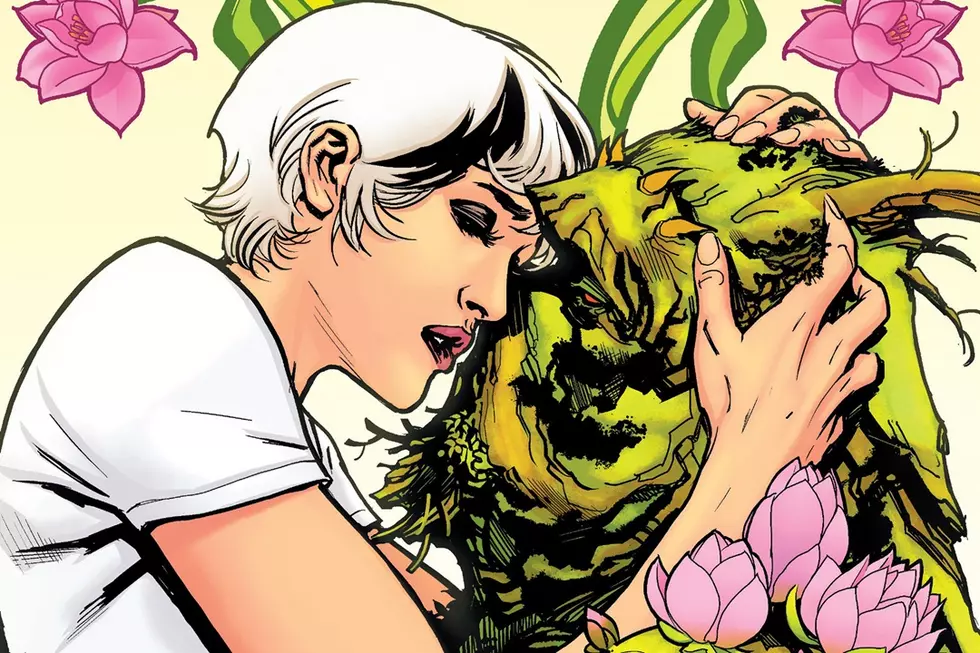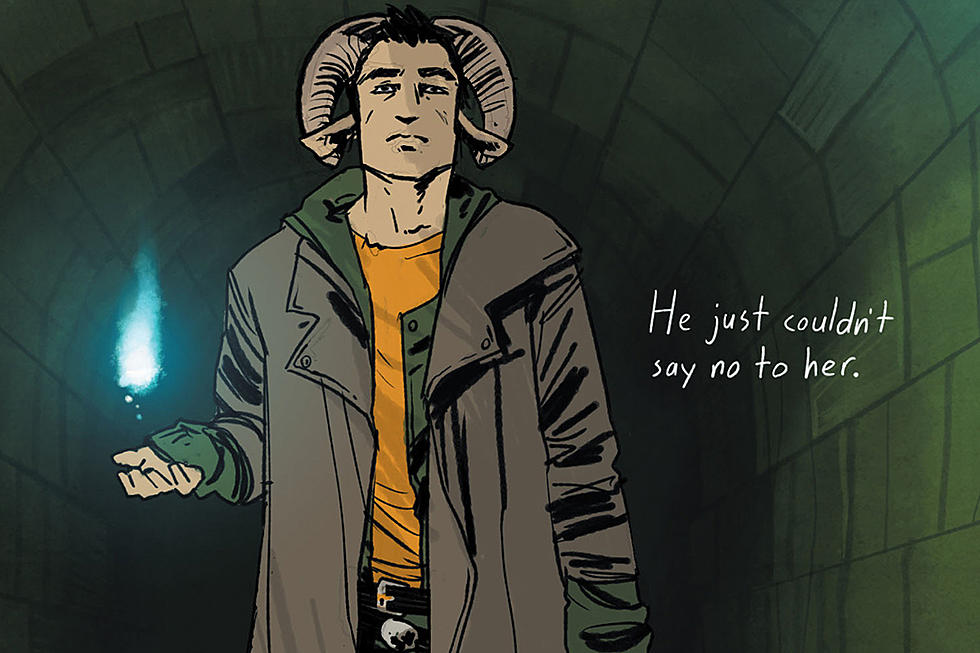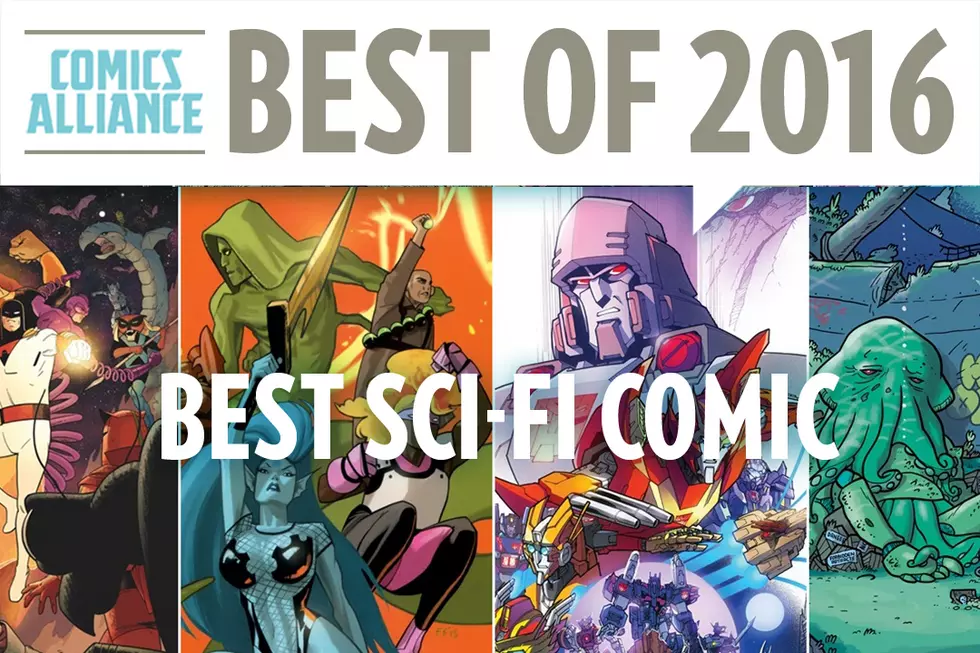![Brian K. Vaughan Defies Genre Conventions And His Past Work In ‘Saga’ [Opinion]](http://townsquare.media/site/622/files/2012/08/untitled-1-1344400879.jpg?w=980&q=75)
Brian K. Vaughan Defies Genre Conventions And His Past Work In ‘Saga’ [Opinion]

Brian K. Vaughan and Fiona Staples' Saga is one of the growing collection of great science fiction comics coming out in 2012. The story of two people from warring space tribes and their newborn child is told from a purely character-based perspective, with a focus on human interaction taking center stage. This represents a fresh approach not just to Saga's space opera, but also to its writer's own past work. While Vaughan's Y: The Last Man and Ex Machina are commercial comic book perennials, the writer's work on Saga is a deliberate and successful change of approach to his craft.Saga is interesting to me in part because Vaughan left comics for television (Lost) as a writer who had his comic book characters rattle off research like an Aaron Sorkin script, but without the benefit of actors to cover it. He would end every comic with OMG-style cliffhangers. His stories seemed incredibly high concept, but placing whatever hook they had way before any of the characters involved. But Vaughan is back, and Saga feels like it is coming from a better, more assured writer. It feels like the relentless treadmill of the writer's room has ground out a new Vaughan, the kind of writer who pushes at his own boundaries and strives to make something that defies the easily sellable elevator pitch-leveled product.
 All those familiar tics of Y: The Last Man and Ex Machina are gone, or sublimated into the narrative to make them strengths. Vaughan's characters no longer recite historical facts because Saga is science fiction, there are no facts to recite (which shows a lot of restraint considering the amount of expository dialog you can get away with in sci-fi comics). There are cliffhangers, but they feel far more organic and minor key. The high concept of Saga is practically non-existent. Instead it's a more complex kind of idea, where the two star-crossed lovers are from warring narratives, not just an actual war. It's space opera vs. fantasy, science vs. magic, horns vs. wings, and so on. These two people are escaping the culture war that surrounds their lives so they can have a kid -- sure, it's easy to get that metaphor. But it isn't "What if all the men died?" or "What if Mayor Bloomberg had an evil jetpack from space?" It's also the kind of idea that you can completely ignore and just pay attention to the story instead, which is a rare opportunity in comics, where it's an either/or situation between plot machines or Important Allegories For Modern Living.
All those familiar tics of Y: The Last Man and Ex Machina are gone, or sublimated into the narrative to make them strengths. Vaughan's characters no longer recite historical facts because Saga is science fiction, there are no facts to recite (which shows a lot of restraint considering the amount of expository dialog you can get away with in sci-fi comics). There are cliffhangers, but they feel far more organic and minor key. The high concept of Saga is practically non-existent. Instead it's a more complex kind of idea, where the two star-crossed lovers are from warring narratives, not just an actual war. It's space opera vs. fantasy, science vs. magic, horns vs. wings, and so on. These two people are escaping the culture war that surrounds their lives so they can have a kid -- sure, it's easy to get that metaphor. But it isn't "What if all the men died?" or "What if Mayor Bloomberg had an evil jetpack from space?" It's also the kind of idea that you can completely ignore and just pay attention to the story instead, which is a rare opportunity in comics, where it's an either/or situation between plot machines or Important Allegories For Modern Living.
Saga is a couple and their baby on the run; royalty and bounty hunters looking for them; set against an unending war; plus ghosts and space prostitutes and robots. It's nice to just get down to that in a comic and watch a story get told. Of course there's the New Testament aspects to the "Royalty pursuing baby" thing, but Vaughan shrugs that off in a caption pretty early on. Which isn't to say that these are kind of shallow, as there is a lot of anger lingering behind the story. But there's no lecturing here. There is some narrative incongruousness -- characters eating boxed cereal, people bitching about their cellphone signal, alien ghosts who wear logo tees -- but it's not enough to pull you out of the book, or really question the entire thing. There is a little bit of a nagging feeling that tools like phones or "dudes in his underwear eating cereal" are easy telegraphs for things we understand even though they can feel wrong in a wholly conjured world.
Vaughan's characters are way, way more compelling too, and the story seems to want to just tell this story about these four or five people. Everyone here has logical, realistic motivations, and messy human reactions and contradictions. When Marko (the Dad in this couple) breaks his oft-stated blood vow never to draw his sword again when someone threatens his baby, you love that character a whole lot more. When Alana, the pregnant mother is played as catty and uncomfortable instead of the cliché serene and exhausted mom archetype, it's fantastic. The Will, the Boba Fett/Gogo Yubari-style bounty hunter/compelling tertiary character just wants to ignore his ex and go get laid on the company retainer, but the guy has a conscience. The villain, Prince Robot IV (was that name a placeholder they just never changed?) seems to have a temper rising from his frustration and disappointment at not being able to be with his pregnant wife, as opposed to some kind of class-based hatred. I like characters like this and I wish that I could read more comics about characters like this.



The narration of Saga is from the perspective of Hazel, the baby/macguffin being carried around by the story's protagonist couple. The fact that the story seems to be progressing in a very cautious, meandering manner -- almost in real-time -- gives the narration a kind of irony. The irony is what saves the narration from being simple comics expository spackle, at least most of the time. Hazel is narrating how her parents got together from somewhere far in the future (I really hope this is a kind of Tristram Shandy space opera, where the narrator never quite gets to his own birth in the regressive nature of his story, instead of a generational storyteller type of thing).
Fiona Staples's handling of the characters is her best skill. Each of her characters, even those without faces, have expressive gestures, body language and "acting." Her fight scenes have become more fluid and visceral as the series goes on. Comparing the fights in issues #3 and #5 show that the core of her combat is not bodies connecting but how the conflicts play out on the combatants' faces. Expression communicates intent, and intent is paid off with motion. It's great, and it's a clever way to tailor her portrait-heavy style towards kinetics
The problem I have with Staples' work in Saga is how she has chosen to depict the world(s) the characters inhabit. It is the backgrounds, but not just the backgrounds. I've seen other work by Staples and she's not someone who doesn't know how to draw beautiful, lush environments. In Saga, though, she doesn't. It is a decision that I think greatly hurts the book, as everything an audience has come to expect science fiction comics to deliver (and rightly so) is barely given the time of day. I understand that Staples' approach is is probably based in a decision to foreground character over spectacle, but the result is a book that sometimes feels rushed and unsatisfying, no matter how good the story is.
The first issue's gigantic vista of two armies fighting under a torn-apart bridge is mostly little stick figures set against a couple of vague color tones. This is a comic I buy the same day as James Stokoe's Orc Stain. That really sucks. There's no nice way to say that it sucks and feels lazy. But to its credit, Saga places the interpersonal narrative first, but seemingly at the expense of affording the reader a glimpse at the world the characters actually live in. In science fiction/fantasy/anything, this an enormous mistake to make. The best scenes in this comic are those in the Sextillion, and not surprisingly, those scenes establish the most fully delineated world in Saga. Place and setting matter more in these types of stories, not less. This is why Star Wars and Game of Thrones have such lasting effects on their fanbases -- if you take away the character stories, the worlds remain just as compelling.
Maybe Vaughan and Staples don't feel that way, and you can't blame some kind of push back to such dominating examples of genre (even though those are the examples that Vaughan used to describe his comic: "Star Wars meets Game of Thrones," although Saga doesn't read like either of those things at all). There's always going to be an easy dismissal of this comic because it doesn't feel the need to pay off on that "vista" aspect of fantastical genre fiction, and it is a shame because that's a no-go for a lot of people who might enjoy the hell out of this story.
On an issue-to-issue basis, there's always something that makes Saga fantastically compelling comics. As pointed out by Abhay Khosla, the Sextillion issue works as a harsh criticism of any and all sexualization of figures in comics, coming down on all deformations of figure based in stunted sexuality that just wants to turn all women into objects or a collection of attributes, or ultimately children. The third issue leaps from "it takes a village to raise a child" platitudes to nasty, violent interrogation fueled by alien-on-robot racial slurs and back to a jab at the phenomenon of indigenous peoples being demonized by the West, but ultimately asked to help out when the West goes to war.

The latest issue seems to be bringing forward what I think will be the ongoing theme of Saga, that every one of these characters is going to be forced into doing things they despise in order to live up to the decisions they've made. Prince Robot IV (again, what?) is going to go off half-cocked and kill people who could help him because he's a well of anger. The Will is going to have to deal with his ex and take a job he doesn't want if he hopes to affirm any sort of conscience. Marko's going to have to come to terms with killing the sh*t out of people who threaten his daughter, no matter what kind of sacred vow he made up to make himself feel like an adult. And Alana's going to have to keep her husband -- who we seem to get the sense she doesn't have too good a handle on, personality-wise -- in check.
Saga a great comic, one that has moments and flashes of being an outstanding comic. The demands of making a book like this probably factor into how the story is being told. As anyone who's worked in television would likely have a deep understanding of, commerce dictates form. Comics is no different, of course, and I'm sure a monthly schedule is the reason for a lot of the problems I have with Saga, especially with respect to the way the world around these characters is visually depicted. Even with that reservation, I wish there were dozens of comics like Saga. Comics that don't have to define anything except the story and the characters they are formed around, comics that seem to come from legitimate collaboration, comics by an artist who wants to tell the story with faces, and an established (hell, wildly successful) writer who is actively trying to move away from everything that once defined him. This is a story these people passionately want to tell, and I don't think there are very many comics that offer anything like that these days.

More From ComicsAlliance


![Comics’ Sexiest Female Characters (From A Queer Perspective) [Love & Sex Week]](http://townsquare.media/site/622/files/2017/02/hg_featured.jpg?w=980&q=75)







